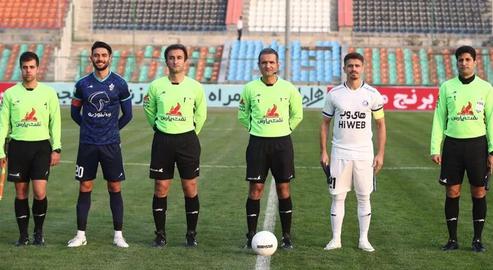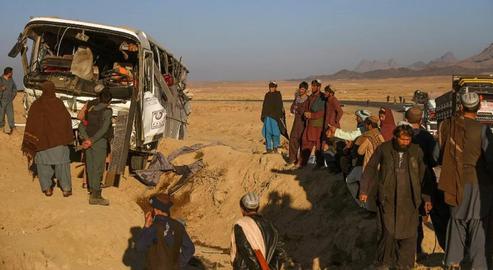A former Iranian football referee has broken his silence about corruption in the beautiful game and the influence of what he termed the country’s "football mafia".
On Tuesday, October 26, Vahid Salehi made a series of shocking claims on Islamic Republic Radio about his former colleagues “selling” penalties at league competitions, making back-room deals with sports moguls and fiddling their expenses to the tune of billions of tomans. An unjustified but well-timed penalty kick, he claimed, would now set teams back around 100 billion tomans (US$3.6m).
Though the revelations had a lot of traction in Iranian media this week, allegations of corruption are hardly new to the Iranian footballing community. For years, according to both managers and a few vocal coaches, some Iranian football clubs have set aside special budgets just for sweetening referees.
The Stakes are Higher in 2021
"Two seasons ago,” Salehi told the state broadcaster on Tuesday, “the two teams of Mes [Rafsanjan] from Kerman and Aluminium from Arak had a match. Mes didn’t advance to the Pro League after scoring one goal too few. This is what happens: Team X says it’s spent 40 billion tomans for one year. In fact, I’m going to spend 41 billion tomans, and leave that extra one billion for the football judiciary."
By “the football judiciary”, retired referee Vahid Salehi was referring to his own profession. Though the remarks were shocking, it’s far from the first time this allegation has been made. In 2013, Mohammad Ahmadzadeh, then-head coach of Malavan FC in Bandar Anzali, said live on Iranian TV: "What annoys us is that the clubs bosses say ‘We’ve spent billions of tomans on the teams each year, so what’s wrong if we set aside 100 million for refereeing?’" Over the last eight years, partly thanks to inflation, football clubs’ annual budgets have skyrocketed from a cursory few billion tomans, as Ahmadzadeh described, to tens of billions.
Referees’ Bribe-Taking Out in the Open
In footballing history, no figure is more infamous for enabling corruption and collusion than the Singaporean match-fixer Wilson Raj Perumal. In the early 2010s he received his fourth conviction in Finland over a string of backhander deals, up to and including for FA Cup matches. In his memoir Kelong Kings, Perumal wrote: "I'm not a FIFA agent; I’m just a middleman. Someone who goes beyond people’s imaginations.” He went on to prove how he had been able to engineer the result of more than 80 matches involving national teams, up to the end of 2014.
One of them was a friendly match played between Iran and Bahrain in 2010. "I appointed the referee," Perumal proudly wrote.
The issue of “contaminated whistles” in Iranian football has been raised many times over the years. But never have the allegations yielded a result. One very clear instance was the case of Mohsen Ghahremani, who oversaw matches for the Iran Pro League from 2001 to 2015. In September 2013, after a historic match between Persepolis and Isfahan’s Sepahan FC, striker Ali Daei publicly accused Mohsen Ghahremani of attempted extortion.
“I knew the referee was bending towards the other direction,” Daei said. “They had deliberately formed a team of 10 from the second minute. Mr. Ghahremani, I don’t know your telephone number or account numbers." But, he claimed, before the match the referee had sent a message to the assistant coach of Persepolis asking them to deposit money into his account.
For his part, Ghahremani had never hesitated to admit that his decisions favored one team or the other. In 2010, he spoke on TV about a refereeing “mistake” he had once made to the detriment of Esteghlal FC: "The Rah-Ahan FC attacker hit Esteghlal's defender. He also hit Esteghlal's goalkeeper, and sent the ball into Esteghlal's goal. Mahmoud Fekri, the captain of Esteghlal, asked me: 'Was this a foul or not?'. I said yes, it was a foul; all his moves were illegal. But because the fans cursed me from the stands, I allowed Rah-Ahan’s goal."
After Daei’s revelations, Ghahremani was banned from the profession. But he returned to the role just 16 months later by order of the national Football Federation.
In the same year, during a Tehran Derby match between Esteghlal and Persepolis, a perfectly healthy goal by Persepolis’s Mohammad Nouri was declared offside by referee Morteza Karimi. In a subsequent report by Khabar-e-Razshi, Karimi was quoted as having openly said: “A friend of Parviz Mazloumi, the head coach of Esteghlal, offered me 16 million tomans and a 50-inch LCD TV to stop Esteghlal from losing the match."
Other actors further up the footballing chain of command are sometimes involved. Back at the end of the 2005 to 2006 season, Peykan FC was promoted to the Pro League. Two months after the decisive play-off match between Peykan and Damash, one of the directors of the Football Federation’s referee committee attended a party hosted by Sepahan. There, they told a veteran journalist: "After the game, they called up our referee and offered him 20 million tomans. The referee called me and said they’d brought an envelope for me and the assistant referees. We immediately told him to come back, and changed the refereeing team. I called Peykan club myself and said, 'From now on, come to the boss [kadkhoda]; don’t go and talk to the referee!'"
The bosses now keep their hands more firmly behind the scenes and are less open about these negotiations. Nonetheless, the stories occasionally slip out.
A Tangle of Interests
Any player, coach or manager in Iranian football will have heard the name Arka Iranian; officially a legal entity, unofficially a titan slowly devouring the game. In February 2016, ILNA news agency named a group of men – Amir Houshang Saadati, Amir Arsalan Mortaz, Saman Mehdizadeh, Ali Nikoumanesh, Houman Samimi, Vali Khorsandi and Hamid Mashhadi – as the directors of this match-fixing company. It added that a man named Gholam Ganji was one of the most important intermediaries.
Gholam Ganji is one of the most prominent football brokers in Iran, who was arrested by the Ministry of Intelligence in March 2009 as part of a crackdown on corruption in sport. He spent around four months in Evin Prison, but then went straight back into the same job. The CEO of Arka Iranian, Amir Houshang Saadati, is also one of the closest unofficial intermediaries of Persepolis.
The Iranian Football Federation itself has done nothing to prevent match-fixing in Iran, but has made the desultory gesture of inviting some referees to speak with its ethics committee. Mansour Ghanbarzadeh, a member of the Football Federation's board of directors, has claimed: "The majority of our referees are clean but there are some flaws." With regard to the most recent revelations from Vahid Salehi, the Federation’s secretary-general Hassan Kamranifar simply said: “I haven’t heard from Mr. Salehi, but we are investigating.” He, too, used to be an international referee.
Related coverage:
The Corrupt Iranian Football Official Testing FIFA's Patience
The Return of the Ultimate (and Corrupt) Football Insider
Jobs for the Boys: Business Partner of Official's Sons Gets Top Football Role
Corruption, Lies, and Iran's Football Federation
A Very Iranian Football Scandal: How Did a Second Rate Manager Cost A Million Dollars a Month?
visit the accountability section
In this section of Iran Wire, you can contact the officials and launch your campaign for various problems


























comments